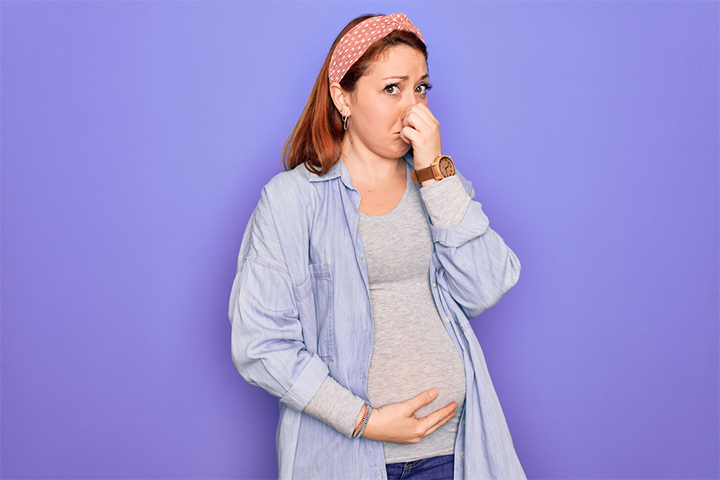
Image: Shutterstock
We’ve all heard of pregnancy’s best buddy — morning sickness. Most women experience this in the first twelve weeks of pregnancy, and the real lucky ones don’t. But there’s a different category of women who experience morning sickness in all its glory, the worst of its kind that never seems to stop. If you’ve been throwing up to the point where you realize it’s making you terribly sick and you’re losing weight instead of gaining weight during your pregnancy, you might have what’s known as hyperemesis gravidarum (1).
It is unpleasant, and it needs to be medically addressed. Unfortunately, not a lot of people know of it, nor do they know of its seriousness. Read on to find out more about this to know whether or not you suffer from it!
What Is Hyperemesis Gravidarum?
Image: Shutterstock
Let’s first get this out of the way — it is an actual medical condition. We’re making it a point to say this because many women who suffer from this condition don’t get the acknowledgment they need. This is a disorder in which women suffer from extreme morning sickness during their pregnancy, which can cause severe vomiting and nausea. It is a severe condition that can result in weight loss, dehydration, and even an electrolyte imbalance. It can also affect your kidney, rupture your esophagus, and have an impact on your baby (2), (3).
What makes it different from morning sickness is that it is persistent, severe, and can cause serious health issues. Morning sickness usually begins around the first month of pregnancy but goes away in the third or fourth month. Hyperemesis gravidarum, on the other hand, starts at around six weeks but doesn’t go away (4), (5).
The jury is still out on what causes hyperemesis gravidarum, but as of now, researchers believe that the excessive production of the human chorionic gonadotropin (hCG) hormone is to blame. This hormone is released during pregnancy. Genetics might play a role in this as well. More research is needed to understand the causal factors of hyperemesis gravidarum fully (6).
The Symptoms: What It Feels Like To Suffer From Hyperemesis Gravidarum
You may experience hyperemesis gravidarum differently from the rest, but there are a few common symptoms you will share, and they are as follows (7):
- Nausea And Vomiting Is Your Constant
Image: Shutterstock
The main characteristic of this disorder is that you will feel nauseous all the time during your pregnancy. This, in turn, will lead to you vomiting close to three to four times a day. You may even end up vomiting the water you drink, and it will be difficult to eat food.
- You Get Dehydrated
Image: Shutterstock
Since nothing stays inside, not even water, you’re at a high risk of getting dehydrated. In some cases, you may get so dehydrated that you will require medical intervention with an IV. You need to drink water, even if you can’t. It may help to take small sips through the day, or you can also suck on some ice cubes.
- Your Appetite Is Gone, So Is Your Weight
Image: Shutterstock
Pregnancy is often synonymous with food cravings, but if you’re suffering from hyperemesis gravidarum, the chances are that pretty much everything repulses you. Because of your loss of appetite, you will end up losing a good amount of weight, which isn’t very good for your baby or yourself. Some women have lost close to ten pounds because of this disorder.
- Your Sense Of Smell Is Heightened
Image: Shutterstock
Most women suffering from this disorder complain of a heightened sense of smell. To deal with this, it may help to apply some essential oils. Hopefully, this won’t make you nauseous as well!
- Triggers, Triggers, Everywhere
Image: Shutterstock
Even the slightest movement may set off nausea. Other triggers include bright light, loud noise, various smells, sudden movement, and too much talking. But that is not all; sometimes, a trigger can be as trivial as the memory of a particular food!
What You Need To Know
Image: Shutterstock
At this point, you’re probably wondering if there is a cure, but unfortunately, there is no cure per se, but you can treat the symptoms. After consulting your doctor, you can take a few anti-nausea medications. Additionally, you will have to take plenty of rest. Doctors may require you to get an IV to ensure you are not dehydrated. Vitamin B-6, as well as ginger, is used to treat vomiting as well. Hyperemesis gravidarum ends shortly after giving birth, but you may notice that your postpartum recovery takes longer (8).
In addition to all that puking, you may also have to deal with unsolicited advice from people who tell you that “morning sickness” is normal and is no big deal. Unfortunately, it is a big deal, and it can be very unfair to you when people discount what you’re going through. Have someone to talk to through this period. Take care of yourself physically but remember that your mental health is important too. This condition can take a toll on you mentally, so go easy on yourself and reach out for help whenever you need it. You can also join a few online forums for expectant mothers who are in the same boat as you (9).
Pregnancy comes with many ups and downs, but for some, the course of their pregnancy might be particularly challenging. If you fall into this bracket, know that help is available. And just like all the other downsides to pregnancy, this too will pass. Have you experienced hyperemesis gravidarum? Do you know someone who has? Tell us what your experience was in the comments below!



















